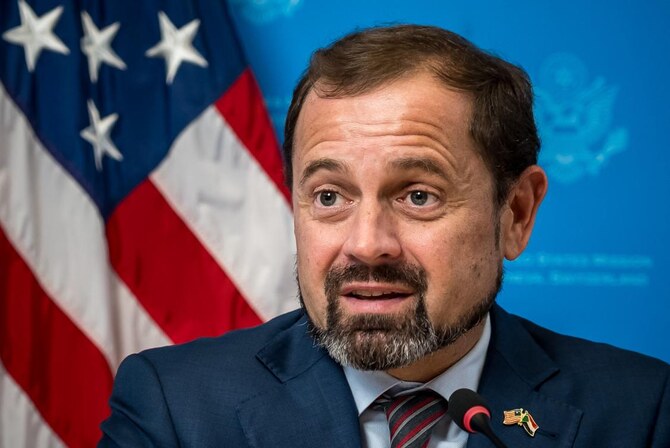World News
Ceasefire negotiations in Sudan Will Begin Despite Army Absence

Despite the Sudanese government’s intention to abstain, US-mediated discussions on a ceasefire were scheduled to begin in Switzerland on Wednesday.
The conversations must proceed, according to US Special Envoy for Sudan Tom Perriello, who stressed that they do so because the suffering people of Sudan, who have been decimated by the terrible conflict, cannot wait any longer.
Since April 2023, the paramilitary Rapid Support Forces (RSF), commanded by former deputy Mohamed Hamdan Daglo, and the Sudanese army, led by Abdel Fattah al-Burhan, the de facto ruler of the nation, have been engaged in combat.
Although the RSF delegation is in Switzerland for the confidential negotiations, which are being held at a secret location, the invitation has not yet been accepted by the Sudanese armed forces (SAF).
Saudi Arabia and Switzerland are co-hosting the discussions, which might last on for ten days. The African Union, Egypt, the United Arab Emirates, and the United Nations are participating as observers.
One of the biggest humanitarian disasters in history has been brought on by the horrific conflict.
Tens of thousands have died and one in five people have been forced to escape their homes due to the conflict. More than 25 million people, or more than half of the nation’s population, suffer from severe hunger.
“This is the moment for peace,” Perriello declared on Tuesday.
SAF has not yet consented to take part. He urged the administration to “seize the opportunity,” saying, “Yet we will proceed with our international and technical partners to explore every option to support the people of Sudan.”
“A feeling of immediacy”
Previous rounds of negotiations in Jeddah, Saudi Arabia, had produced no results.
There won’t be any official mediation between the warring parties if the SAF chairs stay empty this time, but the other participants will continue with the agenda of the negotiations.
In addition to finding means to respect agreements, Perriello stated that there was a “deep sense of urgency to make progress this week towards a cessation of hostilities and expanded humanitarian access.”
“We cannot wait; the Sudanese people cannot afford it.”
Prior to the negotiations, an RSF delegation member verified that they were in Switzerland.
The member told AFP on Tuesday, “We don’t know anything about the army delegation; our delegation has arrived in Geneva to start negotiations.”
The Sudanese administration claims that before entering ceasefire talks, more talks are necessary.
Graham Abdelkader, the minister of media for Sudan, declared that the country was refusing “any new observers or participants,” particularly in light of Washington’s “insistence on the participation of the United Arab Emirates as an observer.”
The Sudanese army has maintained its accusation that the UAE supports the RSF.
Applying pressure to Burhan
Burhan was facing “serious internal divisions” about whether to participate, according to Alan Boswell, the International Crisis Group’s project director for Horn of Africa. Some in his camp were in favor of discussions, while others were “fiercely opposed.”
Given that official negotiations have not taken place since last year, “restarting the talks at all would be a breakthrough,” he told AFP.
“The US is firmly in charge of the agenda, and all three of Saudi Arabia, the United Arab Emirates, and Egypt are present as well, which is the big difference from prior rounds. This gathers in one place all the principal outside players who have influence over the opposing parties.
He warned that if the government does not show up, Burhan will face increasing pressure from outside sources if he is perceived as “the main obstacle to ending the war.”
“There is no more”
The largest displacement crisis in global history is occurring in Sudan. Over 10.7 million people are internally displaced in the nation, while a further 2.3 million have gone overseas.
The head of the UN migration agency’s Sudan mission, Mohamed Refaat, stated, “What was once a land of rich culture, history, and hope has become a battlefield of despair, where millions of families are trapped in a living nightmare.”
Refaat declared, “Enough is enough. Without a ceasefire… every day we delay, more lives are lost, more dreams are shattered, and more futures are stolen.”
UNICEF spokesman James Elder reported that he had spoken with a surgeon treating youngsters hurt in Saturday’s deadly shelling of a football pitch in Khartoum State.
“He told me that if the people who are funding this war could only see these wounds, these dead children, they would find a way to sit down and have a conversation.”

